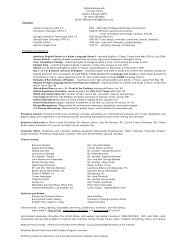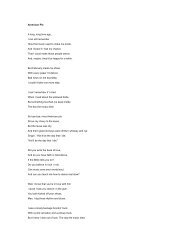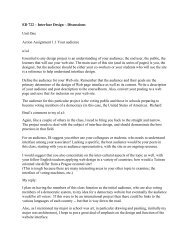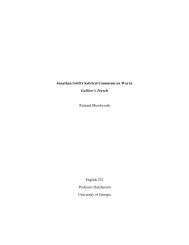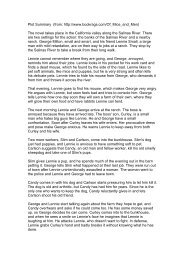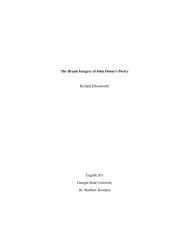Research Methodology, pdf - 2B2B.org
Research Methodology, pdf - 2B2B.org
Research Methodology, pdf - 2B2B.org
You also want an ePaper? Increase the reach of your titles
YUMPU automatically turns print PDFs into web optimized ePapers that Google loves.
UM3 Nietzsche, F. (1874,1983) Schopenhauer as Educator, in Untimely Meditations, Transl. R.J<br />
Hollingdale. New York: Cambridge University Press.<br />
EH Nietzsche, F. (1889, 1967) Ecce Homo (together with On the Genealogy of Morals),<br />
(translated and edited by W. Kaufmann). New York: Random House.<br />
Fitzsimons, Peter (2003)Nietzsche's Schopenhauer and Education. Peter Fitzsimons, University<br />
of Auckland. Retrieved October 10, 2003, from<br />
http://www.vusst.hr/ENCYCLOPAEDIA/nietzsche.htm<br />
Johanson,Donald & Edgar,Blake. From Lucy to Language (1996) New York: Simon & Schuster.<br />
Human Evolution Ancestral Lines. Retrieved October 10, 2003 from<br />
http://www.handprint.com/LS/ANC/evol.html<br />
BBC Television (2003). Hunt or be Hunted, episode from Walking with Cave Men broadcast on<br />
the Discovery Channel.<br />
------<br />
Response to Michelle's response to my U1/D2<br />
Thank you for you insights and observations. I have saved the information in my POJ of my ED<br />
5006 file.w<br />
-------<br />
from Shawn Fitzgerald:<br />
As one might expect many of you looked at how knowledge is created in very different ways. For<br />
example, some of you considered knowledge gained from the qualitative and quantitative<br />
perspectives, some considered basic vs applied ways of knowing, and others looked at<br />
knowledge gained through explanation, prediction, or description. Several looked at knowledge<br />
gained through educational research efforts compared to less structured ways of knowing such as<br />
intuition, tenacity, authority figures, and last, but not least, experience.<br />
As you are all aware based on my postings to each of you who posted before Friday, I posted a<br />
learner's observation regarding experience compared to educational research. Some of you<br />
responded to my prompts with well supported statements about similarities and differences.<br />
Some believed that you could not have one without the other. Without offering an answer at this<br />
time I will pose the question one more time and I would like each of you to come back to this<br />
question at the end of the course to see where you stand at that time after reading more about<br />
validity and reliability of research design. Once again:<br />
Which is more likely to result in "Valid" and "Reliable" observations?<br />
Interesting observations on how knowledge is created. You mention both research and<br />
experience and suggest that through experience you have gained insights into parenting, teaching,<br />
etc., that you may not have had otherwise. My question to you is this, how is knowledge obtained



